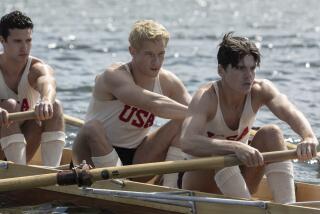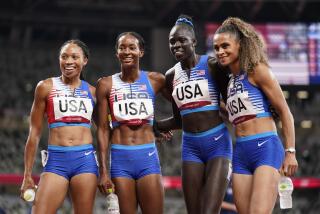Redgrave Rows to Fifth Gold
- Share via
SYDNEY, Australia — It is an amazing accomplishment.
Steve Redgrave is 38 and his sport, rowing, requires such monumental effort, such exquisitely painful physical exertion, that most people give up by the time they’re 30.
But the world’s greatest rower wouldn’t give up. Today, with his British boatmates Matthew Pinsent, James Cracknell and Tim Foster, Redgrave won his fifth gold medal in five consecutive Olympics.
Only Hungarian fencers Aladar Gerevich and Pal Kovacs had won golds in five consecutive Games. In an endurance sport such as rowing, it’s unprecedented.
IOC President Juan Antonio Samaranch, who has returned from Spain after his wife’s funeral, gave Redgrave a special Olympic pin and said of the rower, “He is one of the most important athletes in the history of the Olympic Games. He is in the first flight.”
Melissa Ryan, 28, of Bloomington, Ind., and Karen Kraft, 31, of San Mateo, won the bronze medal in the women’s pair. Four years ago, they won a silver medal and less than a month later, Ryan donated a kidney to her brother.
“I feel great about it,” Ryan said. “I think this must be a first, to donate a kidney and then win an Olympic medal.”
Ryan and Kraft led for nearly three-quarters of their race but the pair faded and were caught first by the gold medalists from Romania, Georgeta Damian and Doina Ignat, then, in the last few meters, by silver medalists Rachael Taylor and Kate Slatter of Australia.
Winning a surprising silver was the U.S. men’s pair of Ted Murphy, 28, of West Newton, Mass., and Sebastian Bea, 23, a California grad from Berkeley.
“It was a surprise to me, coming through those big guys at the end,” Murphy said. “I thought we were fourth.”
The gold went to Michel Andrieux and Jean-Christophe Rolland of France, and the Australian pair of Matthew Long and James Tomkins got the bronze. Less than a second separated the top three boats.
But the day belonged to Redgrave.
Before the race started, the father of a New Zealand rower approached him and said, “You’re racing against my son but I still want you to win.”
All week at the rowing venue other competitors wished Redgrave well.
Pinsent said, “He is the ultimate Olympian, the best one Britain has ever produced. It is amazing what he has done. He is an inspiration to us all.”
Redgrave couldn’t think about raising his arms in triumph at the end. He could hardly breathe.
He has learned to live with diabetes, had appendicitis and recovered from an arm injury in the last four years, since winning at Atlanta.
And it was at those Olympics that Redgrave said anyone who saw him racing again had permission to shoot him. His retirement lasted less than three months.
“This is a special thing after four years of hard work,” he said. “Then we got here and I’ve had a good feeling all week. There were some nerves last night from all of us but also a lot of passion.”
Redgrave’s boat took the lead in the first 500 meters of the 2,000-meter race and never gave it up.
“It was all over by the first 200 meters,” Redgrave said.
An Italian boat was pushing hard at the end and finished .38 of a second behind, and the Australians took bronze. The U.S. boat was fifth.
And Redgrave was more circumspect about his retirement talk this time.
“This should be my last Olympics,” he said. “But you never know. We’ll see in four years’ time.”
More to Read
Go beyond the scoreboard
Get the latest on L.A.'s teams in the daily Sports Report newsletter.
You may occasionally receive promotional content from the Los Angeles Times.






